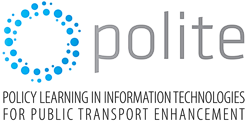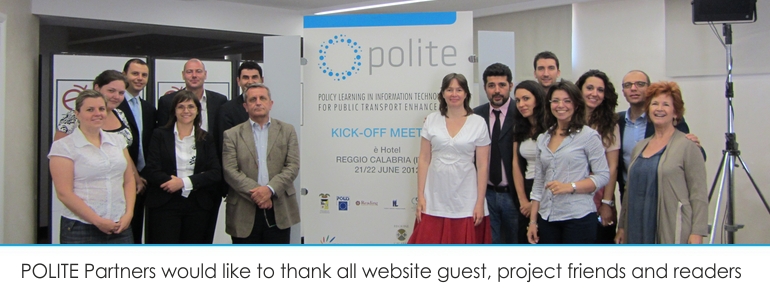In Calabria region (Italy), lessons learnt from the project are being integrated in its new Regional Transport Plan, currently under preparation. The Regional Transport Plan will tackle 4 areas: mobility of persons; mobility of goods; ITS & security; and special areas (e.g. intermodal hub of Gioia Tauro’s port). POLITE will provide direct input to the elaboration of the ITS guidelines for the Plan. To this aim, Calabria will make use primarily of two of the identified good practices within the project: the Mi Muovo good practice coming from Emilia-Romagna region and the Czech Multimodal Journey Planner (IDOS). The integrated ticketing and fare system for all local and regional public transport and on the RER achieved in the Mi Muovo project is interesting for Calabria region which wants to increase the integrated use of public transport with other modes of transport (bike and car sharing, etc.). From the Czech Multimodal Journey Planner (IDOS), Calabria will try to replicate the possibility of providing reliable transport information to travellers and tourists. IDOS is a door-to-door journey planner for the Czech Republic and Slovakia, providing also cross-border travel connections around Europe by bus and train. The reason for the transferability of IDOS good practice is the flexibility and integration of service delivery.
Another POLITE partner – the Institute of Logistics and Warehousing (ILiM), is interested primarily in good practices related to providing information to travellers, secondly in practices for public transport priority and finally smart ticketing. Thus, lessons from POLITE will be used in the infomobility sections of the Polish national and 16 regional transport plans. ILiM is working on the Transportation Plan for Wielkopolska Region and is considering five of the collected in POLITE good practices. One of them is the SkyCash ticketing system which was adopted in Poznan thanks to contacts and exchanges which occurred in the course of POLITE. SkyCash is a mobile ticketing system for public transport and a range of other services such as mobile parking payments or buying entertainment tickets. SkyCash is described in more detail further on in this newsletter in the section presenting ILiM.
The Latvian POLITE partner, Latvian Transport Development and Education Association (LaTDEA), will also adopt the SkyCash mobile ticketing system at home. LaTDEA itself aims to improve, in cooperation with public and private bodies at regional and interurban level, the travellers’ information system in order to obtain higher efficiency and quality levels in the users’ travel experience.
The CzechTransport Research Centre (CDV) has 3 main areas of interest which should promote infomobility. These are:
- Public transport priority systems
- Information system in real time
- SUMP (sustainable mobility plans)
Ticketing, open public transport data, real time solutions and bus priority systems are also topics where CDV takes the role of independent adviser and developer of architecture of these systems. For the work in these areas CDV has selected 3 good practices which to transfer:
- Real time information system & bus priority at signals from Bristol, the UK
- Open public transport data from London, the UK
- Sustainable mobility plan (SMP) from Santander, Spain
POLITE project has also given CDV a useful feedback for the CDV’s multi-modal journey planner, IDOS, which is currently being improved to include real-time information.
By the end of the project each technical partner will produce an implementation plan for its own site. The local implementation plans will outline the local roadmaps for policy development on public transport information systems. They will aim to contribute to the increase of the capacity of public administration staff to implement more effective and efficient policy levers and planning approaches to traveller information systems. POLITE partners remain in close contact in order to provide each other with more detailed input about good practices that they would like to include in their implementation plans.







